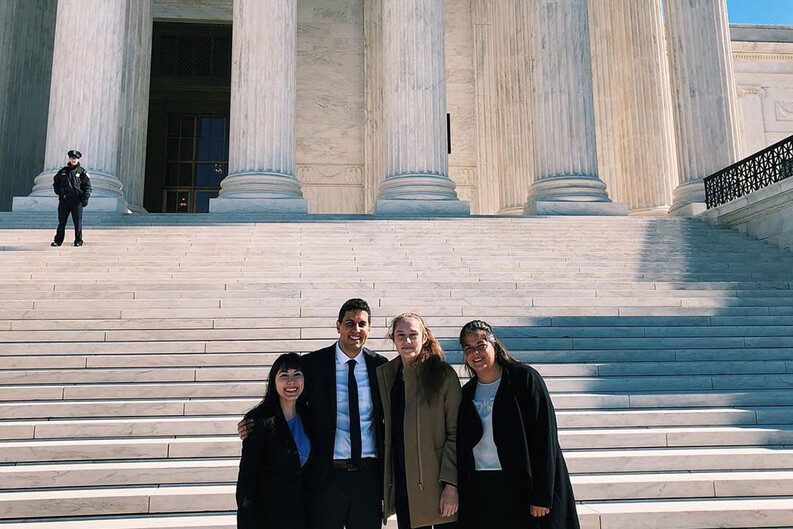Ethics Bureau Celebrates SCOTUS Win

The Ethics Bureau at Yale Law School (EBaY) celebrated a win at the Supreme Court on February 27, 2019 in Garza v. Idaho, for which the Clinic wrote amicus briefs at the cert stage and the merits stage.
In a 6-3 decision with Justice Sonia Sotomayor ’79 writing for the majority, the Court held that a lawyer renders ineffective assistance when, over the objection of the client, the lawyer fails to file a notice of appeal simply because the client signed an appeal waiver as part of a guilty plea. More specifically, the Court held that it is deficient performance not to file a notice of appeal in light of a client’s clear request to do so, regardless of whether the client signed an appeal waiver, and that courts must presume prejudice under Strickland v. Washington when this occurs.
The case regards Gilberto Garza, who in 2015 entered into two plea agreements with provisions stating that he “waive[d] his right to appeal.” After that, he informed his lawyer repeatedly that he wanted to appeal his case. His lawyer did not file a notice of appeal.
The question at issue in the case was whether the failure of Garza’s lawyer to file a notice of appeal constitutes ineffective assistance of counsel, and in particular, if a “presumption of prejudice” applies.
Clinic member Darcy Covert ’20, who worked on both amicus briefs and travelled to Washington D.C. to see oral arguments at the Supreme Court, said that the case affirms the rights of criminal defendants to strong representation.
“Every criminal defendant is constitutionally entitled to a lawyer who will stand by his side and advocate zealously on his behalf.” she said. “Cases like Mr. Garza’s illustrate the critical role that legal ethics can play in ensuring that the criminal legal system delivers on that guarantee.”
In the briefs, EBaY argued that under agency law and principles of legal ethics, the decision whether to file a notice of appeal belongs to the client, regardless of whether the client signed an appeal waiver. The argument of client autonomy built on the Court’s decision from last term in McCoy v. Louisiana, a case in which EBaY also authored a cert-stage brief and, alongside 10 law school professors, a merits-stage brief in support of the criminal defendant’s ineffective assistance of counsel claim, which ultimately prevailed.
In Garza v. Idaho, the cert-stage brief was written by Darcy Covert ’20, Valeria M. Pelet del Toro ’19, Heather Richard ’18, and Jamie Durling ’18 and submitted February 22, 2018.
The merits-stage brief was written by Covert, Pelet del Toro, and Elizabeth Villarreal ’19 and submitted August 17, 2018. At this stage, the EBaY team worked over the summer while all the members were also working full-time jobs.
Clinic member Pelet del Toro ’19 said, “Although this might seem like a small rule, the Garza decision is profoundly consequential for defendants across the country. It firmly puts the authority behind the decision to appeal back where it belongs — in the hands of the client.”
The dissent in the case was written by Justice Clarence Thomas ’74, with Justice Neil Gorsuch joining in full and Justice Samuel Alito ’75 in part. The dissent would have held that counsel’s performance was neither deficient nor prejudicial.
EBaY views the dissent as concerning. “A robust ineffective assistance of counsel doctrine is an essential tool criminal defendants have for holding their lawyers to the ethical standards they are obligated to meet,” said Villarreal.
The Clinic made a few unique points that were adopted by the Court, including that a lawyer must, pursuant to his duty of competence, perform a thorough review of all potential grounds of appeal before forfeiting a client’s appeal, and that this review cannot be performed within the short periods most jurisdictions give to file a notice of appeal. This is significant, Villarreal said, because it shows why the filing of a notice of appeal is a ministerial task rather than a strategic decision, and therefore prejudice must be presumed when the lawyer does not perform it.
Since EBaY was founded in 2011, it has submitted 12 amicus briefs at the cert stage (3 the clinic supported were granted), and 7 at the merits (the clinic has been on the winning side 5 times).
Villarreal said that the victory ultimately benefits the legal community’s understanding of its own professional obligations.
“The Ethics Bureau is grateful for the opportunity to be involved in so many of the Supreme Court’s most recent cases involving professional responsibility issues,” Villarreal said. “We’re optimistic that the Court will continue to uphold high ethical standards for lawyers.”
The Ethics Bureau at Yale advises lawyers on how to proceed when faced with violations of the Model Rules of Professional Conduct and other ethical dilemmas. Students draft amicus briefs in cases involving professional responsibility; help people with ineffective assistance of counsel claims; and offer ethics advice to nonprofit organizations. A weekly class on professional responsibility is also part of the bureau. The Ethics Bureau is taught by Lawrence Fox, the George W. Crawford Visiting Lecturer in Law.


